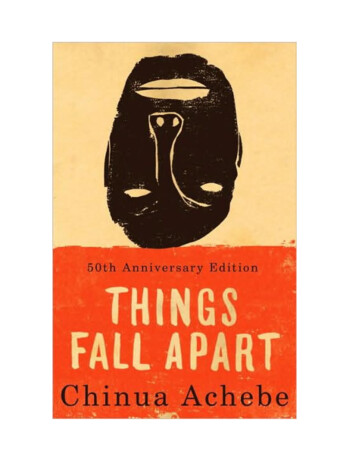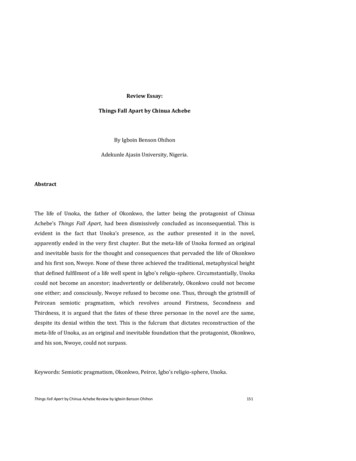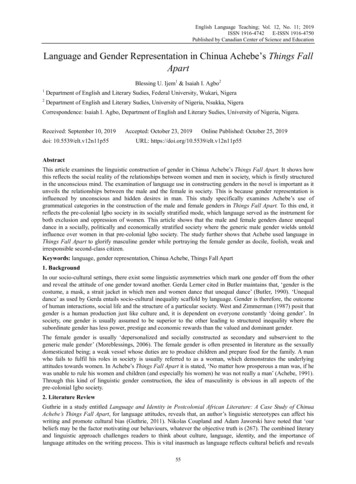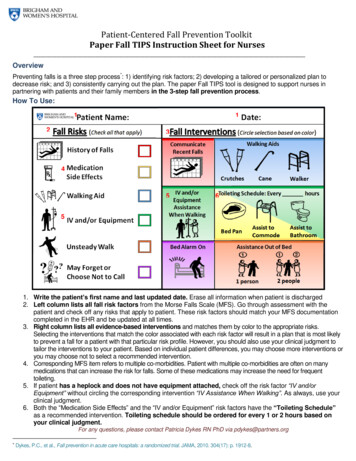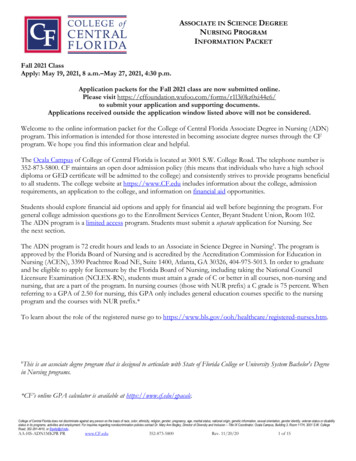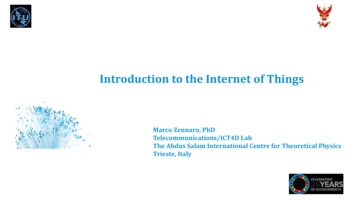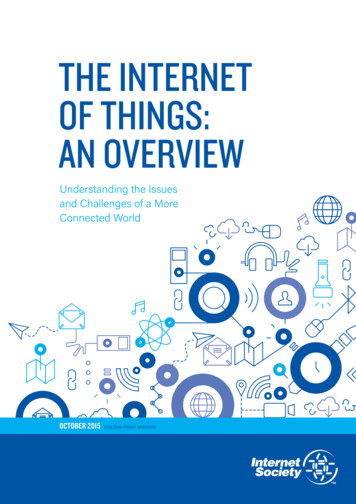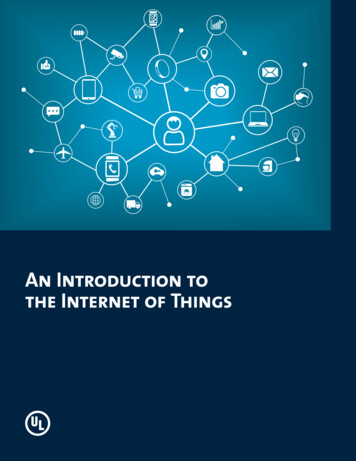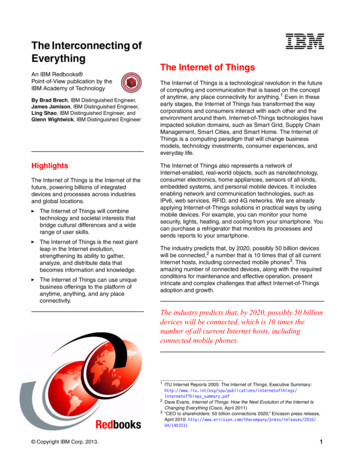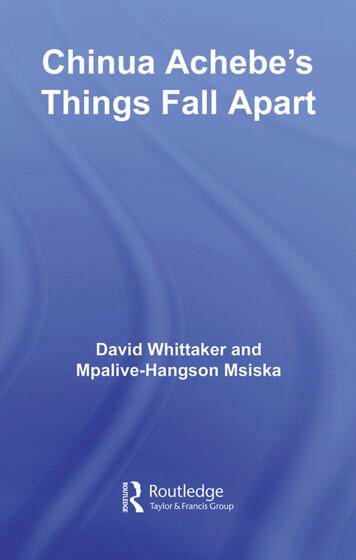
Transcription
Chinua Achebe’sThings Fall Apar tSince its publication in 1958 Chinua Achebe’s Things Fall Apart has won globalcritical acclaim and is regarded as one of the most influential texts of postcolonialliterature. Offering an insight into African culture that had not been portrayedbefore, this is both a tragic and moving story of an individual set in the widercontext of the coming of colonialism, as well as a powerful and complex politicalstatement of cross-cultural encounters.This guide to Chinua Achebe’s compelling novel offers: an accessible introduction to the text and contexts of Things Fall Apart a critical history, surveying the many interpretations of the text from publication to the present a selection of critical writing on Things Fall Apart, by Abiola Irele, AbdulJanMohamed, Biodun Jeyifo, Florence Stratton and Ato Quayson, providinga variety of perspectives on the novel and extending the coverage of keycritical approaches identified in the survey section cross-references between sections of the guide, in order to suggest linksbetween texts, contexts and criticism suggestions for further reading.Part of the Routledge Guides to Literature series, this volume is essential readingfor all those beginning detailed study of Things Fall Apart and seeking not only aguide to the novel, but a way through the wealth of contextual and criticalmaterial that surrounds Achebe’s text.Dr David Whittaker is a Lecturer at Birkbeck College, University of London. Hisresearch interests are in the areas of Nigerian and African literature and in thefield of postcolonial studies and he has published a number of articles in journalsand anthologies.Dr Mpalive-Hangson Msiska is a Senior Lecturer in English and Humanities atBirkbeck College, University of London. He has published many books, journalarticles and conference papers on postcolonial literature, critical and culturaltheory and identity.
Routledge Guides to LiteratureEditorial Advisory Board: Richard Bradford (University of Ulster at Coleraine),Shirley Chew (University of Leeds), Mick Gidley (University of Leeds), JanJedrzejewski (University of Ulster at Coleraine), Ed Larrissy (University of Leeds),Duncan Wu (St. Catherine’s College, University of Oxford)Routledge Guides to Literature offer clear introductions to the most widelystudied authors and texts.Each book engages with texts, contexts and criticism, highlighting the range ofcritical views and contextual factors that need to be taken into consideration inadvanced studies of literary works. The series encourages informed but independent readings of texts by ranging as widely as possible across the contextual andcritical issues relevant to the works examined, rather than presenting a singleinterpretation. Alongside general guides to texts and authors, the series includes‘Sourcebooks’, which allow access to reprinted contextual and critical materialsas well as annotated extracts of primary text.Already available:*Geoffrey Chaucer by Gillian RuddBen Jonson by James LoxleyWilliam Shakespeare’s The Merchant of Venice: A Sourcebook edited by S. P.CerasanoWilliam Shakespeare’s King Lear: A Sourcebook edited by Grace IoppoloWilliam Shakespeare’s Othello: A Sourcebook edited by Andrew HadfieldWilliam Shakespeare’s Macbeth: A Sourcebook edited by Alexander LeggattWilliam Shakespeare’s Hamlet: A Sourcebook edited by Sean McEvoyWilliam Shakespeare’s Twelfth Night: A Sourcebook edited by Sonia MassaiJohn Milton by Richard BradfordJohn Milton’s Paradise Lost: A Sourcebook edited by Margaret KeanAlexander Pope by Paul BainesJonathan Swift’s Gulliver’s Travels: A Sourcebook edited by Roger D. LundMary Wollstonecraft’s A Vindication of the Rights of Woman: A Sourcebookedited by Adriana CraciunJane Austen by Robert P. IrvineJane Austen’s Emma: A Sourcebook edited by Paula ByrneJane Austen’s Pride and Prejudice: A Sourcebook edited by Robert MorrisonByron, by Caroline FranklinMary Shelley’s Frankenstein: A Sourcebook edited by Timothy MortonThe Poems of John Keats: A Sourcebook edited by John StrachanThe Poems of Gerard Manley Hopkins: A Sourcebook Edited by Alice JenkinsCharles Dickens’s David Copperfield: A Sourcebook edited by Richard J. DunnCharles Dickens’s Bleak House: A Sourcebook edited by Janice M. Allan*Some titles in this series were first published in the Routledge Literary Sourcebooks series, edited byDuncan Wu, or the Complete Critical Guide to Literature series, edited by Jan Jedrzejewski andRichard Bradford.
Charles Dickens’s Oliver Twist: A Sourcebook edited by Juliet JohnCharles Dickens’s A Tale of Two Cities: A Sourcebook edited by Ruth GlancyHerman Melville’s Moby-Dick: A Sourcebook edited by Michael J. DaveyHarriet Beecher Stowe’s Uncle Tom’s Cabin: A Sourcebook edited by DebraJ. RosenthalWalt Whitman’s Song of Myself: A Sourcebook and Critical Edition edited byEzra GreenspanRobert Browning by Stefan HawlinHenrik Ibsen’s Hedda Gabler: A Sourcebook edited by Christopher InnesGeorge Eliot by Jan JedrzejewskiThomas Hardy by Geoffrey HarveyThomas Hardy’s Tess of the d’Urbervilles edited by Scott McEathronCharlotte Perkins Gilman’s The Yellow Wallpaper: A Sourcebook and CriticalEdition edited by Catherine J. GoldenKate Chopin’s The Awakening: A Sourcebook edited by Janet Beer and ElizabethNolanEdith Wharton’s The House of Mirth by Janet Beer, Pamela Knights andElizabeth NolanJoseph Conrad by Tim MiddletonJoseph Conrad’s Heart of Darkness by D.C.R.A. GoonetillekeThe Poems of W. B. Yeats: A Sourcebook edited by Michael O’NeillE. M. Forster’s A Passage to India: A Sourcebook edited by Peter ChildsD.H. Lawrence by Fiona BecketSamuel Beckett by David PattieW.H. Auden by Tony SharpeRichard Wright’s Native Son by Andrew WarnesJ.D. Salinger’s The Catcher in the Rye by Sarah GrahamChinua Achebe’s Things Fall Apart by David Whittaker and Mpalive-HangsonMsiskaIan McEwan’s Enduring Love by Peter ChildsArundhati Roy’s The God of Small Things by Alex TickellAngela Carter’s Nights at the Circus by Helen Stoddart
Chinua Achebe’sThings Fall ApartDavid Whittaker andMpalive-Hangson Msiska
First published 2007by Routledge2 Park Square, Milton Park, Abingdon, Oxon OX14 4RNSimultaneously published in the USA and Canadaby Routledge270 Madison Ave, New York, NY 10016This edition published in the Taylor & Francis e-Library, 2007.“To purchase your own copy of this or any of Taylor & Francis or Routledge’scollection of thousands of eBooks please go to www.eBookstore.tandf.co.uk.”Routledge is an imprint of the Taylor & Francis Group, an informa business 2007 David Whittaker and Mpalive-Hangson MsiskaAll rights reserved. No part of this book may be reprinted orreproduced or utilized in any form or by any electronic, mechanical,or other means, now known or hereafter invented, includingphotocopying and recording, or in any information storage orretrieval system, without permission in writing from the publishers.British Library Cataloguing in Publication DataA catalogue record for this book is available from the British Library.Library of Congress Cataloging in Publication DataWhittaker, David, 1955–Chinua Achebe’s Things fall apart / David Whittaker and Mpalive-Hangson Msiska.p. cm—(Routledge guides to literature)Includes bibliographical references and index.1. Achebe, Chinua. Things fall apart. 2. Igbo (African people) in literature.3. Nigeria—In literature. I. Msiska, Mpalive-Hangson. II. Title.PR9387.9.A3T538 2007823′.914—dc222007028582ISBN 0-203-49640-X Master e-book ISBNISBN 10: 0–415–34455–7 (hbk)ISBN 10: 0–415–34456–5 (pbk)ISBN 10: 0–203–49640–X (ebk)ISBN 13: 978–0–415–34455–5 (hbk)ISBN 13: 978–0–415–34456–2 (pbk)ISBN 13: 978–0–203–49640–4 (ebk)
ContentsAcknowledgementsNotes and referencesixxIntroductionxi1: Text and contexts1The authorThe textLiterary contextsCultural contexts3615222: Critical historyIntroduction and early critical receptionAuthenticity and the question of universalityNationalist approachesAchebe and African literary languageAnthropological approachesUniversalism as humanismNationalist universalist humanismMarxist criticismFeminist approachesThe intervention of postcolonial theoryConclusion3: Critical readingsExtract from ‘The Tragic Conflict in the Novels of Chinua Achebe’ byAbiola Irele3537394244485257626466757779
viiiCONTENTSExtract from ‘Sophisticated Primitivism: The Syncretism of Oral and LiterateModes in Achebe’s “Things Fall Apart” ’ by Abdul JanMohamedExtract from ‘For Chinua Achebe: The Resilience and the Predicament ofObierika’ by Biodun Jeyifo‘How Could Things Fall Apart For Whom They Were Not Together?’ byFlorence StrattonExtract from ‘Realism, Criticism, and the Disguises of Both: A Reading ofChinua Achebe’s Things Fall Apart’ by Ato Quayson4: Further reading and web resourcesNotes on 3
AcknowledgementsAbiola Irele, ‘The Tragic Conflict in the Novels of Chinua Achebe’, in CriticalPerspectives on Chinua Achebe, 1978, Three Continents Press, edited by C.L.Innes and Bernth Lindfors. Reproduced by kind permission of the author.Abdul JanMohamed, ‘Sophisticated Primitivism: The Syncretism of Oral andLiterate Modes in Achebe’s “Things Fall Apart” ’, ARIEL, 15(4), October 1984.Reproduced by permission of the Board of Governors, University of Calgary,Calgary.Biodun Jeyifo, ‘For Chinua Achebe: The Resilience and the Predicament ofObierika’, in Chinua Achebe: A Celebration, 1990, Heinemann and DangarooPress, edited by Kirsten Holst Petersen and Anna Rutherford. Reproduced bykind permission of Biodun Jeyifo and Kirsten Holst Petersen.Florence Stratton, ‘How Could Things Fall Apart For Whom They Were NotTogether?’, in Contemporary African Literature and the Politics of Gender, 1994,Routledge, Florence Stratton. Reproduced by kind permission of the author andpublisher.Ato Quayson, ‘Realism, Criticism, and the Disguises of Both: A Reading ofChinua Achebe’s Things Fall Apart with an Evaluation of the Criticism Relatingto It’, in Research in African Literatures, 25(4), Winter 1994, Indiana UniversityPress. Reproduced by permission of the publisher.
Notes and referencesPrimary textUnless otherwise stated, all references to the primary text are taken from ChinuaAchebe, Things Fall Apart (Oxford: Heinemann Writers Series), 1986.The initial reference in each part will contain full bibliographic details and allsubsequent references will be in parentheses in the body of the text, stating thechapter, page number and part number, e.g. (ch. 1, p. 5). The chapter number isprovided to help anyone reading an edition of the novel that differs from this one.Secondary textReferences to any secondary material can be found in the footnotes. The firstreference will contain full bibliographic details, and each subsequent reference tothe same text will contain the author’s surname, title and page number.FootnotesAll footnotes that are not by the authors of this volume will identify the source insquare brackets, e.g. [Irele’s note].All footnotes in the Critical Readings part are the original author’s footnotes.Cross-referencingCross-referencing between sections is a feature of each volume in the RoutledgeGuides to Literature series. Cross-references appear in brackets and include section titles as well as the relevant page numbers in bold type, e.g. (see Texts andcontexts, pp. 00–00).
IntroductionWith the fiftieth anniversary of the publication of Chinua Achebe’s Things FallApart in 2008, the literary world will celebrate one of the most remarkable storiesin the history of African literature. Few could have predicted the impact andinfluence that this first novel by an unknown young writer from Nigeria wouldhave when it was first published in 1958. Things Fall Apart is not only the mostcelebrated Nigerian novel ever published, it is also the most widely read andstudied work of African fiction, both abroad and throughout the continent itself.Since it was first published, the novel has sold around ten million copies worldwide and been translated into over forty-five languages, a feat unequalled by anyother work of African fiction. Things Fall Apart has also proved to be animmensely influential work for African writers, becoming the progenitor of awhole movement in fiction, drama and poetry that focuses on the revaluation oftraditional African cultures and the representation of culture conflicts that hadtheir genesis in the colonial era. The extraordinary popular and critical acclaimfor the novel, as well as its enduring influence, has led to its pre-eminent positionas one of the iconic works of postcolonial fiction.Although the novel was written in the pre-Independence Nigeria of the 1950s,it is set in the period around the beginning of the twentieth century when Europeans first came into contact with the Igbo people of eastern Nigeria. It is significantthat in the final years of colonial rule in Nigeria, Achebe chose to recall an erawhen a traditional African community was being irrevocably transformed by thearrival of the British colonialists and missionaries. It is a novel which looks backelegiacally at this pre-colonial culture and to the epochal changes wrought byBritish colonialism, yet it is also a text which looks forward to the future,inscribed with both the idealism and the anxieties of the decade in which it waswritten. At the heart of the novel is the story of Okonkwo, one of the mostcompelling creations in all of modern African literature. He stands both resolutelyfor the beliefs and traditions of his culture, and implacably against the encroaching influence of the colonial usurpers. Okonkwo is undoubtedly a heroic figure,yet he is also a tragically flawed individual who comes to symbolize both thesupreme embodiment, as well as the internal contradictions, of his culture’sideals. What often makes Things Fall Apart such a memorable novel, however, isthe cast of other characters who inhabit the community in which Okonkwo lives.Things Fall Apart was notable for being the first novel by a West African to
xiiINTRODUCTIONportray graphically how colonized subjects perceived the arrival of the colonizingEuropeans, and one of Achebe’s significant achievements in the novel is the wayhe succeeds in depicting Umuofia as a vibrant and sophisticated society, withits own complex culture and elaborate moral and ethical codes, while neversuccumbing to a desire to portray it as an idyllic pre-colonial utopia.Our guide to Chinua Achebe’s Things Fall Apart aims to provide a scholarlyexegesis of the text and introduce readers to important contextualizing historicaland cultural perspectives, as well as to provide a detailed historical overview ofthe changing critical responses to the novel. In Part 1 of our guide we introducethe novel, its author, and its literary and cultural contexts. We begin with a briefbiography of Chinua Achebe and his upbringing, as well as his careers in writing,broadcasting, politics and academia. In the second section we focus, in somedetail, on the text of Things Fall Apart, and describe its distinctive features,including its narrative structure, use of language, characterization and mainthemes. Achebe wrote the novel at a time when West African literature was firstbeginning to flourish and in the third section of Part 1 we explore the literarycontexts of the novel. We begin with a brief examination of the burgeoning literary scene in post-war West Africa and the experimentation with the novelisticform that early African writers were undertaking during this period. In a numberof important ways, Things Fall Apart is a direct response to a whole canon ofbooks written about Africa’s history and cultures by Europeans, which beganappearing from the sixteenth century onwards, and we briefly examine the historyof this writing and its ideological imperatives. The underlying racist discourses ofmany of these works were to be echoed in much of the later European fiction thatwas set in Africa. We situate Things Fall Apart in relation to this European literary heritage and examine the unlikely influence that one particular work, JoyceCary’s Mister Johnson (1939), had on Achebe’s novel. We go on to analyseW. B. Yeats’ poem ‘The Second Coming’ (1921), which provides the epigraph toThings Fall Apart, and Achebe’s appropriation and subversion of Yeats’ Eurocentric vision of the cyclical motions of history. In the final section of Part 1 weexamine the cultural and historical contexts of the novel. We briefly outline thecontemporary historical and cultural milieu of the post-war era in Nigeria, andthe political and cultural nationalism that was a defining feature of the period inwhich Achebe was writing, before going on to examine in some detail the natureof the pre-colonial Igbo society and culture that provides the crucial contextualbackground to the drama in the novel.Things Fall Apart has inspired an enormous amount of critical attention in thefive decades since its publication and this critical fascination with the text showsno sign of diminishing. Indeed, the history of critical approaches to the novel hasoften reflected broader changes in literary criticism and theory in general. In Part 2we provide an overview of the changing critical approaches to Things Fall Apartby tracing the critical history of the novel from the earliest responses, whichfocused on questions of cultural conflict, the authenticity of the novel’s language,of its form and its world-view, to a subsequent concern with the novel’s universality which is often elaborated in terms of the novel’s comparability with Westernliterary forms and styles such as Aristotelian Tragedy and nineteenth-centuryRealism. We then examine the later criticism and its preoccupations with questions of orality and those of gender ideology in the novel, before concluding with
INTRODUCTIONxiiian analysis of contemporary postcolonial approaches in which issues of ideologyand nation-formation, as well as the general question of the novel’s semiotics ofrepresentation are examined.In Part 3 we bring together five essays by leading international scholars whohave written most illuminatingly and innovatively on Things Fall Apart. Therange and depth of the essays is evident in the diversity of their approaches, whichencompass neo-Marxist, post-structuralist, feminist and postcolonial theoreticalperspectives on the text. We have included essays that represent some of the mostimportant criticism on the novel, and which provide both ‘classic’ and innovativereadings, the majority of which have been published in relatively obscure monographs and journals. We include essays by Abiola Irele, Abdul JanMohamed,Biodun Jeyifo, Florence Stratton and Ato Quayson. Each essay is prefaced with abrief introduction to the essay itself and to its author.In Part 4 we provide a guide to further reading and internet resources whichwill be useful for those who wish to pursue their study of the novel and itscontexts further. The material is arranged into sections under the titles: Theauthor, The history of colonialism in Africa, Postcolonial literary theory, Africanand Nigerian literature, Achebe’s Things Fall Apart, Journals and periodicals, andWeb resources. We recommend a short list of books, journals and websites thatare relevant to the text and which are widely accessible, and provide a descriptionof the focus of each resource.
1Text and contexts
The authorAlbert Chinualumogo Achebe, as he was originally christened, was born into anIgbo family on 16 November 1930 in Ogidi, in what is now eastern Nigeria. Hisfather, Isaiah Okafor Achebe, had been converted to Christianity as a young man,and both his parents were devout Christians. Although Isaiah Achebe had becomean evangelizing church catechist and a teacher for the Church Missionary Society,the young Chinua grew up in a community in which many people still lived atraditional way of life. Chinua was to have a strict Christian upbringing, but healso grew up surrounded by neighbours and an extended family who continuedto practise the Igbo traditional religion and observe the various rituals and festivals of the culture. In his autobiographical essay ‘Named for Victoria, Queen ofEngland’ (1973), Achebe has described some of his earliest memories of growingup in Ogidi in the 1930s:We lived at the crossroads of cultures. We still do today; but whenI was a boy one could see and sense the peculiar quality and atmosphereof it more clearly . . . On one arm of the cross we sang hymns and readthe Bible night and day. On the other my father’s brother and hisfamily, blinded by heathenism, offered food to idols . . . What I doremember is a fascination for the ritual and the life on the other arm ofthe crossroads.1The perceived distinction between ‘heathen’ and Christian cultures was by nomeans absolute for the young Achebe, as he has recently described:Both my parents were strong and even sometimes uncompromising intheir Christian beliefs, but they were not fanatical . . . My father’s halfbrother was not the only heathen in our extended family; if anything, hewas among a majority. Our home was open to them all, and my father1Chinua Achebe, ‘Named for Victoria, Queen of England’ (1973) reprinted in Hopes and Impediments: Selected Essays 1965–1987, London: Heinemann, 1988, pp. 22–23.
4TEXT AND CONTEXTSreceived his peers and relatives – Christian or not – with kola nut andpalm-wine.2The important question of Achebe’s relationship with traditional Igbo culture,and the influence of his Christian upbringing, is one that we shall return to inmore detail later in this chapter when we look at the cultural contexts of his lifeand work (see Texts and contexts, pp. 26–33).Achebe undertook his early education in church schools at Ogidi and Nekede,and he went on to win a scholarship to study at the prestigious GovernmentCollege in Umuahia, where he was a secondary school student between 1944 and1948. Among those who attended the college during this period were VincentChukwuemeka Ike, Gabriel Okara, Elechi Amadi and Christopher Okigbo, all ofwhom were later to become major Nigerian writers. Achebe was a gifted studentand he was awarded a scholarship to study medicine at the first university to beestablished in Nigeria, the newly founded University College in Ibadan, which atthat time was a constituent college of the University of London. After his first yearof studies Achebe decided to switch courses to study English Literature, ReligiousStudies and History. As part of his English Literature course, which had a curriculum similar to that of a contemporary British university, he studied the worksof Shakespeare, Milton, Defoe, Swift, Wordsworth, Coleridge, Keats, Tennyson,Eliot, Frost, Joyce and Hemingway as well as literature which was consideredrelevant to Nigerian students, such as the ‘African novels’ of Joseph Conrad,Graham Greene and Joyce Cary. Achebe’s reaction to the derogatory and demeaning portrayals of Africans in these novels was to have a profound influence on hislater writing (see Texts and contexts, pp. 18–21). It was also during this period atuniversity in Ibadan that Achebe first began writing essays, humorous sketchesand short stories for various student magazines.Achebe obtained an honours degree in English in 1953, and after a short periodof working as a teacher he became an editor for the Nigerian BroadcastingCorporation (NBC), where he was to hold various senior positions until theBiafran crisis in 1966. It was during his early years working at the NBC thatAchebe wrote Things Fall Apart. He travelled to London in 1956 to attend atraining course at the BBC where his manuscript came to the attention of one ofhis course tutors, the novelist and literary critic George Phelps, who recognizedthe quality of Achebe’s writing and recommended it for publication. Things FallApart was first published in London by Heinemann on 17 June 1958. Althoughthe novel was met with some initial critical scepticism, it has gone on to receiveconsiderable critical and popular acclaim around the world. Chinua Achebe’spre-eminent position in the field of Nigerian and African literature was established with the publication of his first novel, and his reputation has only grown inthe decades since his most famous work first appeared. Achebe’s second novel,No Longer at Ease (1960), was set in the contemporary world of 1950s Lagosand has as its protagonist Obi Okonkwo, the grandson of Things Fall Apart’smain character, Okonkwo. Achebe was to publish two other novels in this period,2Chinua Achebe, ‘My Home Under Imperial Fire’ in Home and Exile (2001), Edinburgh: Canongate, 2003, pp. 10–11.
TEXT AND CONTEXTS5Arrow of God (1964) and A Man of the People (1966), as well as a collection ofhis short stories The Sacrificial Egg and Other Short Stories (1962), and a workfor children Chike and the River (1966).At the time of writing Things Fall Apart in the 1950s the young Achebe wasdeeply influenced by the growing pan-Nigerian nationalist movement in the colony, a political sentiment that was shared by many of Nigeria’s educated elite.As in many of the British colonies across West Africa, Nigerian nationalistsoptimistically looked forward to the day when the country would become a selfdetermining nation and gain its independence from British colonial rule. The anticolonial nationalist movement, and a concomitant form of cultural nationalism,had been gaining considerable strength and support in Nigeria in the years afterthe Second World War, and were to prove a crucial influence on Achebe’s writing.This is an important area of influence on Achebe’s work that will be discussedin more detail later in this chapter (see Texts and contexts, pp. 22–26). Achebewas eventually able to join in the national euphoria that attended the celebrationsfor Nigerian independence on 1 October 1960. The event was an undoubtedlymomentous occasion in modern African history, not only for the fact that one outof every seven Africans had been liberated from colonial rule, for it also witnessedthe creation of Africa’s largest and most populous new nation-state.By 1966, however, the situation in the country had reached a crisis point, withpolitical and ethnic tensions in the republic having led to a military coup and themassacre of thousands of easterners, predominantly but not exclusively Igbos, innorthern and western Nigeria. The growing instability in Nigeria, together withthe decision of the newly created state of Biafra in eastern Nigeria to secede,sparked the devastating Nigerian Civil War. Like many educated Igbos, Achebecame to support the secessionist state of Biafra, and played a prominent role in thenew government, often travelling the world as an ambassador for the Biafrancause. The whole country was traumatized by the years of fighting, which endedonly in 1970 with the defeat of the Biafran government and army. Achebe wasdeeply affected by the war, and particularly by the loss of many friends andacquaintances, including his close friend the poet Christopher Okigbo who waskilled in the fighting. He spent most of the next few decades writing and teachingin universities in America and Nigeria. It was to take Achebe twenty-one yearsbefore he published another major work, Anthills of the Savannah (1987), whichis his last novel to be published. The intervening years were not idle ones, however, for he also published a number of collections of his essays, short stories,poetry and children’s stories and edited the magazine Okike and a number ofanthologies of African fiction. One of his most important achievements duringthis period, in terms of the promotion and dissemination of African literature,was his work as Series Editor for Heinemann’s African Writers Series between1962 and 1990. In 1990 Achebe was involved in a car accident in Nigeria that lefthim with serious back injuries that have since confined him to a wheelchair. Sincethis time he has mostly lived in America, although he has remained active inNigeria’s political and cultural life, and he continues to write and give lecturesaround the world.
6TEXT AND CONTEXTSThe textThings Fall Apart is not a lengthy novel, being approximately one hundred andfifty pages in length, and one of the principal reasons for this brevity is thatAchebe originally conceived it as being only the first part of a much longer narrative. This more ambitious work was to follow three successive generations of thesame family, and span the period from before the arrival of the British colonialiststhrough to the contemporary world of colonial Nigeria in the 1950s. Realizingthat the first section of this longer work was actually a self-contained narrative,one which functioned in its own terms, Achebe decided to divide his manuscriptinto two separate works, which were eventually to become his first two publishednovels: Things Fall Apart (1958) and No Longer at Ease (1960).Delineating a brief outline of the plot of Things Fall Apart reveals a relativelysimple storyline: the narrative begins in the late nineteenth century, at a timebefore Europeans had begun to colonize systematically the interior of West Africa.The protagonist of the novel, Okonkwo, is a renowned, if deeply flawed, memberof a traditional Igbo village, in what is now south-eastern Nigeria. A combinationof hubris and misfortune leads to Okonkwo and his family being banished fromthe village for seven years. The intervening years prove to be epochal ones for thevillage, for the British colonialists have arrived in his absence and introduced theirown system of law and government, and missionaries have begun to convertpeople to the Christian religion. When Okonkwo returns from exile he is dismayed by the changes he finds. He advocates armed resistance to the newcomersand in a fit of pique he murders a court messenger in order to spark off aninsurrection. When he realizes that his fellow villagers will not join him and riseup against the
Chinua Achebe’s Things Fall Apart Since its publication in 1958 Chinua Achebe’s Things Fall Apart has won global critical acclaim and is regarded as one of the most influential texts of postcolonial literature. Offering an insight into African culture that had not been portrayed
